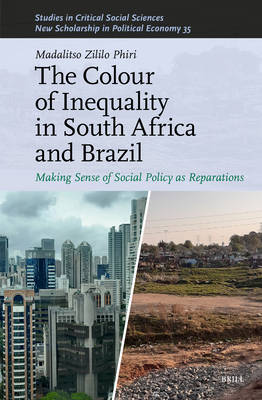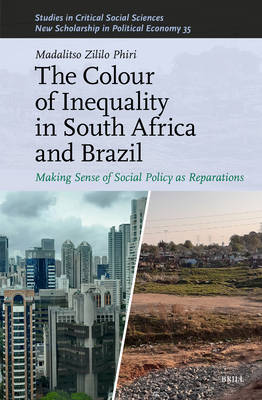
- Afhalen na 1 uur in een winkel met voorraad
- Gratis thuislevering in België vanaf € 30
- Ruim aanbod met 7 miljoen producten
- Afhalen na 1 uur in een winkel met voorraad
- Gratis thuislevering in België vanaf € 30
- Ruim aanbod met 7 miljoen producten
Zoeken
The Colour of Inequality in South Africa and Brazil
Making Sense of Social Policy as Reparations
Madalitso Phiri
€ 218,45
+ 436 punten
Omschrijving
The Colour of Inequality in South Africa and Brazil offers a radical departure by pivoting quotidian encounters of the historically oppressed 'black racialised underclass' within South Africa's and Brazil's social policy architectures that have been shaped by transhistorical trajectories of hierarchical citizenships. Phiri provides two interventions to scholarship, one on 'the epistemic question' and the second on 'the social question', by offering a critique of a racialised neoliberal global political economy that permeates the two countries' social policies. In this volume, Phiri answers the following questions. First, can social policy resolve the residuals and contradictions of transhistorical inequalities that have become systemic features of these aspirant democracies that aim to forge a new social contract under the epoch of a hierarchical racialised neoliberal capitalism? Second, cognisant that both South Africa's and Brazil's socio-political formations are enmeshed in histories of imperial violence, and a hierarchical racialised global political economy carved through the Trans-Atlantic slavery, what paradigmatic and theoretical tools can be deployed to think about social policy as reparations? Third, cognisant of South Africa's and Brazil's oppressed black majorities, which institutions will create conducive conditions for the flourishing and political aesthetics for those racialised as black? The author's contribution to this oeuvre is first to define 'social policy as reparations' through a process of 'worldmaking'.
Specificaties
Betrokkenen
- Auteur(s):
- Uitgeverij:
Inhoud
- Aantal bladzijden:
- 243
- Taal:
- Engels
- Reeks:
- Reeksnummer:
- nr. 337
Eigenschappen
- Productcode (EAN):
- 9789004744394
- Verschijningsdatum:
- 27/11/2025
- Uitvoering:
- Hardcover
- Formaat:
- Genaaid
- Afmetingen:
- 155 mm x 235 mm

Alleen bij Standaard Boekhandel
+ 436 punten op je klantenkaart van Standaard Boekhandel
Beoordelingen
We publiceren alleen reviews die voldoen aan de voorwaarden voor reviews. Bekijk onze voorwaarden voor reviews.











